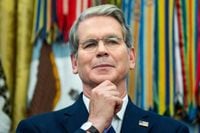On the heels of a contentious summer for U.S. economic policy, the independence of the Federal Reserve has emerged as a central battleground between President Donald Trump’s administration and leading voices in finance and academia. Recent weeks have seen a flurry of op-eds, public warnings, and behind-the-scenes maneuvering, all focused on the delicate balance between political influence and the credibility of America’s most important economic institution.
Citadel CEO Ken Griffin, in a widely discussed opinion piece published in The Wall Street Journal on September 7, 2025, issued a stark warning: President Trump’s public pressure campaign against the Fed, including the dismissal of top officials, is eroding the credibility that underpins U.S. economic strength. “The president’s strategy of publicly criticizing the Fed, suggesting the dismissal of governors, and pressuring the central bank to adopt a more permissive stance toward inflation carries steep costs. These actions raise inflation expectations, increase market risk premiums, and weaken investor confidence in U.S. institutions,” Griffin wrote, co-authoring with Anil K. Kashyap of the University of Chicago Booth Business School.
This warning comes at a moment when Wall Street and policymakers are nervously watching the White House’s approach to the Jerome Powell–led Federal Reserve. Trump’s demands for lower interest rates and for the appointment of dovish members to the Federal Open Market Committee have set off alarm bells among economists who fear a return to the days when political meddling in central bank affairs led to disastrous outcomes.
Griffin and Kashyap’s concerns are not merely theoretical. They point to historical episodes—most notably President Nixon’s pressure on Fed Chairman Arthur Burns in the 1970s, and more recently, former U.K. Prime Minister Liz Truss’s government—that demonstrate how political interference can lead to runaway inflation, market instability, and higher long-term borrowing costs. “While the U.S. benefits from a large stock of credibility accumulated over decades, it isn’t limitless. If eroded, markets will demand far higher interest rates for longer-term debt,” Griffin emphasized, according to The Wall Street Journal.
The stakes are enormous. The U.S. currently faces a $37 trillion national debt, with interest expenses on Treasury notes alone reaching $38.1 billion in July 2025, plus billions more on other forms of government debt. If investor confidence in the Fed’s independence falters, the resulting spike in interest rates could have a crippling effect on government finances, families seeking mortgages, and businesses looking to invest. Even with tariff revenues bringing in around $30 billion a month, such increased costs would threaten the broader economy.
Recent developments have only intensified the debate. On September 8, 2025, Treasury Secretary Scott Bessent began interviewing candidates for the Fed chair position, seeking to balance Trump’s desire for a “rate-cutting crusader” with the need to reassure global markets. Bessent, keenly aware of the political risks—his predecessor Steven Mnuchin was ousted from Trump’s inner circle after a controversial Fed chair pick—has publicly voiced his own concerns. In a Wall Street Journal op-ed, Bessent argued, “The U.S. faces short- and medium-term economic challenges, along with the long-term consequences of a central bank that has placed its own independence in jeopardy. The Fed’s independence comes from public trust. The central bank must recommit to maintaining the confidence of the American people.”
Bessent’s warning is echoed by others in the administration. U.S. Labor Secretary Lori Chavez-DeRemer blamed Federal Reserve Chairman Jerome Powell for the disappointing August 2025 jobs report, which showed employers adding just 22,000 jobs—well below economists’ expectations. “Jerome Powell should be embarrassed by this report because he has not done his job,” Chavez-DeRemer told FOX Business, arguing that higher interest rates are stifling job growth and that the Fed must act to lower rates.
President Trump himself has not shied away from direct criticism, taking to Truth Social to label Powell “Too Late” for not cutting rates sooner. “Jerome ‘Too Late’ Powell should have lowered rates long ago. As usual, he’s ‘Too Late!’” Trump posted, reflecting his administration’s view that the Fed’s current policy stance is impeding economic recovery.
Yet, as Griffin and Kashyap point out, the dangers of undermining the Fed’s autonomy are profound. They reference the U.K.’s 2022 crisis under Liz Truss, where political attacks on the Bank of England and the Office of National Statistics led to a loss of market confidence, emergency central bank intervention, and ultimately higher borrowing costs and painful fiscal adjustments. “The consequences remain: The loss of credibility has left the U.K. facing higher borrowing costs, forcing painful fiscal choices involving spending cuts and tax increases,” Griffin wrote.
Despite these warnings, the Trump administration insists that aggressive action is needed to counteract what it sees as excessive caution from the Fed. Employco USA President Rob Wilson told Fox News Digital, “With an interest rate cut, you will see businesses start to hire in larger numbers. The lower rates will have a ripple effect across the economy.” Wilson and others argue that, with inflation moderating to around 2.7% headline and 3% core, the Fed’s tight monetary policy risks tipping the economy from “controlled cooling into excessive contraction.”
The debate over the Fed’s independence is not new, but the current battle has taken on new urgency given the scale of U.S. debt, persistent inflation, and global economic uncertainty. Griffin, while defending the need for central bank autonomy, acknowledges that the Fed must remain accountable: “Independence isn’t a permanent entitlement; it must be earned and maintained through transparency, accountability and performance. But there is a clear process for accountability. Congress has a duty to oversee the Fed, and this oversight must be free of undue interference from the executive branch.”
Chicago Fed president Austan Goolsbee, in an interview with Fortune, reinforced this point, saying, “Central banks should be held accountable for their actions. And they are. The evidence of what happened during the COVID times, in my view, [is that] there’s a lot of public accountability on the central banks—not just in the United States but everywhere—and that’s totally fine. That’s a completely different issue than: ‘Do elections drive monetary policy decisions?’”
Still, the firing of Bureau of Labor Statistics chief Erika McEntarfer by President Trump has raised fresh concerns about the integrity of official economic data. Oxford Economics’ Nancy Vanden Houten told Fortune that the BLS did not err in its reporting, but rather was following standard procedures for data revision as new information became available. Griffin warned that such actions “highlight risks that recall experiences in emerging markets where political influence eroded institutional credibility.”
As the White House, Congress, and the Fed navigate this fraught landscape, the lesson from history is clear: credibility in economic policymaking is painstakingly built and easily lost. The cost of regaining it—once squandered—can be immense, affecting every American through higher borrowing costs, reduced growth, and diminished global standing. The coming months will test whether the U.S. can preserve the delicate balance that has long anchored its economic power.




